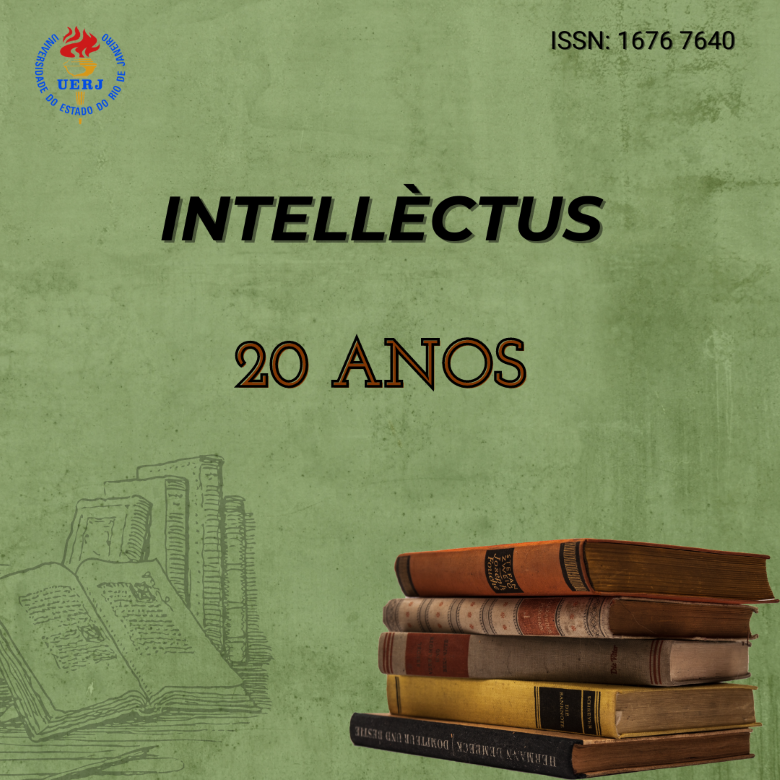The Idea of Progress as an aspect of the ideology of exactitude
DOI:
https://doi.org/10.12957/intellectus.2022.65671Keywords:
progress, ideology of precision, modernityAbstract
For two centuries, the idea of progress has been set as the fundamental proposition around which the human experience of time and the modern regime of historicity were organized. Although, the modern idea of progress can only be comprehended adequately when we insert it in a more general context, marked by the axiomatic belief on the predictability and regularity of the natural and social phenomena sifted by human reason, which determines what Abraham Moles denominated ideology of precision. On that perspective, we shall demonstrate how the idea of progress was historically set as a phenomena aligned with that perspective, taking the works of Hartog and Moles as main references.Downloads
References
BENOIST, Alain de (2008). A brief history of the idea of Progress. Tradução para o inglês de Greg Johnson. The Occidental Quarterly. Vol. 8; n. 1; . pp. 7-16.
BORGES, Jorge Luís (1982). Sobre o Rigor da Ciência: in História Universal da Infâmia, trad. de José Bento. Assírio e Alvim.
BURY, John Bagnell (2011). The Idea of Progress: an inquiry into its origin and grouth. Estados Unidos: CreateSpace publishing.
CAMUS, Albert (2008). O Mito de Sísifo. Tradução de Ari Roitman e Paulina Watch. 5ª edição. Rio de Janeiro: Record.
CONDORCET, Marie-Jean-Antoine-Nicolas Caritat. Outlines of an historical view of the progress of the human mind. Philadelphia: Lang & Ulrich, 1795. Disponível em: http://oll.libertyfund.org/titles/1669. Acesso em: 20 de fevereiro de 2022.
DOMINGUES, Ivan (1996). O fio e a trama: reflexões sobre o tempo e a história. São Paulo: Iluminuras; Belo Horizonte: Editora UFMG.
HARTOG, François (1996). Regime de Historicidade.Time, History and the writing of History - KVHAA Konferenser 37: 95-113 Stockholm. Disponível em: http://www.fflch.usp.br/dh/heros/excerpta/hartog/hartog.html. Acesso em: 24 de fevereiro de 2022.
HARTOG, François (2013). Regimes de Historicidade. Presentismo e Experiências de Tempo. Belo Horizonte: Autêntica.
HESSEN, Johaness (2000). Teoria do Conhecimento. Tradução de João Virgílio G. Cuter. São Paulo: Martins Fontes.
JONES, Richard F (1961). Ancient and Moderns: A Study of the Rise of the Scientific Movement in Seventeenth Century England. 2nd ed. Magnolia, Massachusetts: Peter Smith.
KANT, Immanuel (1784). Ideia de uma História Universal com um propósito cosmopolita. Tradução de Artur Morão. Covilhã: LuSofia Press.
MOLES, Abraham (1995). As Ciências do Impreciso. Tradução de Glória de Carvalho Lins. Rio de Janeiro: Civilização Brasileira.
NISBET, Robert (1980). History of the Idea of Progress. Londres: Transaction Publishers.
NISBET, Robert (1979). Idea of Progress: a bibliographical essay. Literature of Libery. Vol. 2; n. 1, jan-março, pp.7-37.
PAZ, Octavio (1994). Os filhos do barro: do romantismo à vanguarda. Tradução de Olga Savary. Rio de Janeiro: Nova Fronteira.
RICOEUR, Paul (1994). Tempo e Narrativa (tomo 1). Tradução de Constança Marcondes Cesar. Campinas: Papirus.
ROUANET, Sergio Paulo (1987). As razões do Iluminismo. São Paulo: Companhia das Letras
SALZBURG, David (2009). Uma senhora toma chá: como a estatística revolucionou a ciência no séc. XX. Tradução de José Maurício Gradel. Rio de Janeiro: Jorge Zahar.
SHANIN, Teodor (1997). The Idea of Progress. In: RAHNEMA, Majid; BAWTREE, Victoria. The post-development reader. Londres: Zed Books, pp. 66- 71.
TURGOT, Anne-Robert-Jacques (1996). Plan de deux Discour sur l'Histoire Universelle. Paris: ELIOHS. Disponível em: http://www.eliohs.unifi.it/testi/700/turgot/discours.html. Acesso em: 18 de fevereiro de 2022.
Downloads
Published
How to Cite
Issue
Section
License
Autores que publicam nesta revista concordam com os seguintes termos:
Os autores mantêm os direitos autorais e concedem à revista Intellèctus o direito de publicação, sob uma Licença Creative Commons Atribuição 4.0 Internacional, a qual permite que outros distribuam, remixem, adaptem e criem a partir do seu trabalho, mesmo para fins comerciais, desde que lhe atribuam o devido crédito pela criação original.
Os dados e conceitos abordados são da exclusiva responsabilidade do autor.
A revista Intellèctus está licenciada com uma licença Creative Commons Atribuição 4.0 Internacional






